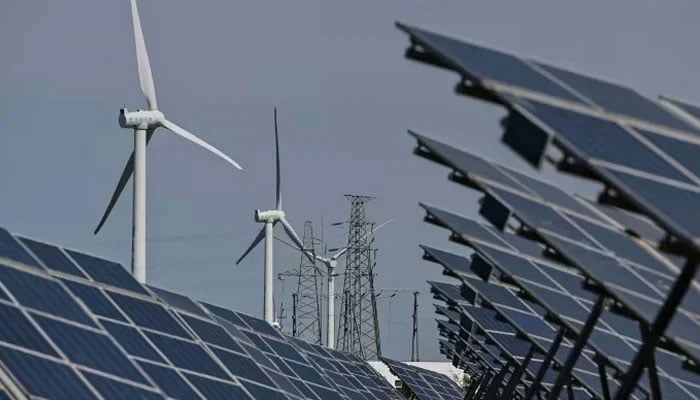New power technologies termed key to sustainable energy future
SWABI: Speakers at the International Conference on Emerging Power Technologies (ICEPT-2025) at Ghulam Ishaq Khan Institute of Engineering Sciences and Technology said that these technologies were crucial for a sustainable and efficient energy future while meeting the increasing power needs of industry and consumers.
The two-day conference was organized by the Faculty of Electrical Engineering (FEE) in collaboration with the Institute of Electrical and Electronics Engineers (IEEE), Islamabad chapter.Haseeb Saqib, general manager of National Engineering Services Pakistan (NESPAK), was the chief guest at the inaugural session. The conference, attended by academicians from across the country, featured speakers who presented their presentations.
Executive Director of the Society for Promotion of Engineering Sciences and Technology in Pakistan (SOPREST) and former WAPDA chairman Shakeel Durrani was also present on the occasion.
Haseeb Saqib said that Pakistan’s power sector was at a crossroads, over the past decade, Pakistan has made significant strides in increasing its generation capacity, yet, the power sector faces persistent, deeply structural challenges that must be urgently addressed.
He highlighted several issues, including seasonal demand imbalance, leading to underutilisation of capacity in winters and peak shortages in summers; high capacity charges, burdening consumers with inflated tariffs; chronic circular debt, caused by poor recoveries, misaligned subsidies, and inefficiencies in governance; dependence on imported fuels, exposing the system to global volatility and forex pressures; aging transmission and distribution networks, leading to high system losses and frequent disruptions; evacuation constraints, especially from the hydropower-rich northern and coal-based southern regions; and a lack of implementation policies.
“Leveraging emerging technologies to drive transformation, overcome these barriers, and align with global energy transitions, Pakistan must urgently embrace emerging power technologies through strategic, systemic reform,” he added.
Prof Dr Syed Muhammad Hassan Zaidi, rector of GIK Institute, said that emerging technologies - from artificial intelligence and machine learning to smart grids, block chain-based energy trading, battery innovations, and renewable integration - are enabling this transformation. “These technologies are not futuristic concepts anymore. These are actively being developed, tested and deployed in many parts of the world, including here in Pakistan,” he added.
Dr Arbab Abdur Rahim said that the conference has provided a platform for academia and industry representatives to discuss the increasing energy needs and devise plans to conduct research while meeting power demands in an environment of artificial intelligence-driven technology.
-
 Savannah Guthrie Shares Sweet Childhood Video With Missing Mom Nancy: Watch
Savannah Guthrie Shares Sweet Childhood Video With Missing Mom Nancy: Watch -
 Over $1.5 Million Raised To Support Van Der Beek's Family
Over $1.5 Million Raised To Support Van Der Beek's Family -
 Diana Once Used Salad Dressing As A Weapon Against Charles: Inside Their Fight From A Staffers Eyes
Diana Once Used Salad Dressing As A Weapon Against Charles: Inside Their Fight From A Staffers Eyes -
 Paul Anthony Kelly Opens Up On 'nervousness' Of Playing JFK Jr.
Paul Anthony Kelly Opens Up On 'nervousness' Of Playing JFK Jr. -
 Video Of Brad Pitt, Tom Cruise 'fighting' Over Epstein Shocks Hollywood Fans
Video Of Brad Pitt, Tom Cruise 'fighting' Over Epstein Shocks Hollywood Fans -
 Jelly Roll's Wife Bunnie Xo Talks About His Huge Weight Loss
Jelly Roll's Wife Bunnie Xo Talks About His Huge Weight Loss -
 Margot Robbie Reveals Why She Clicked So Fast With Jacob Elordi
Margot Robbie Reveals Why She Clicked So Fast With Jacob Elordi -
 Piers Morgan Praised By Ukrainian President Over 'principled Stance' On Winter Olympics Controversy
Piers Morgan Praised By Ukrainian President Over 'principled Stance' On Winter Olympics Controversy -
 Halsey's Fiance Avan Jogia Shares Rare Update On Wedding Planning
Halsey's Fiance Avan Jogia Shares Rare Update On Wedding Planning -
 Instagram Head Adam Mosseri Says Users Cannot Be Clinically Addicted To App
Instagram Head Adam Mosseri Says Users Cannot Be Clinically Addicted To App -
 James Van Der Beek Was Working On THIS Secret Project Before Death
James Van Der Beek Was Working On THIS Secret Project Before Death -
 Las Vegas Father Shoots Daughter's Boyfriend, Then Calls Police Himself
Las Vegas Father Shoots Daughter's Boyfriend, Then Calls Police Himself -
 'Hunger Games' Star Jena Malone Shocks Fans With Huge Announcement
'Hunger Games' Star Jena Malone Shocks Fans With Huge Announcement -
 Ex-OpenAI Researcher Quits Over ChatGPT Ads
Ex-OpenAI Researcher Quits Over ChatGPT Ads -
 Prince William Criticized Over Indirect Epstein Connection
Prince William Criticized Over Indirect Epstein Connection -
 'Finding Her Edge' Creator Explains Likeness Between Show And Jane Austin Novel
'Finding Her Edge' Creator Explains Likeness Between Show And Jane Austin Novel




